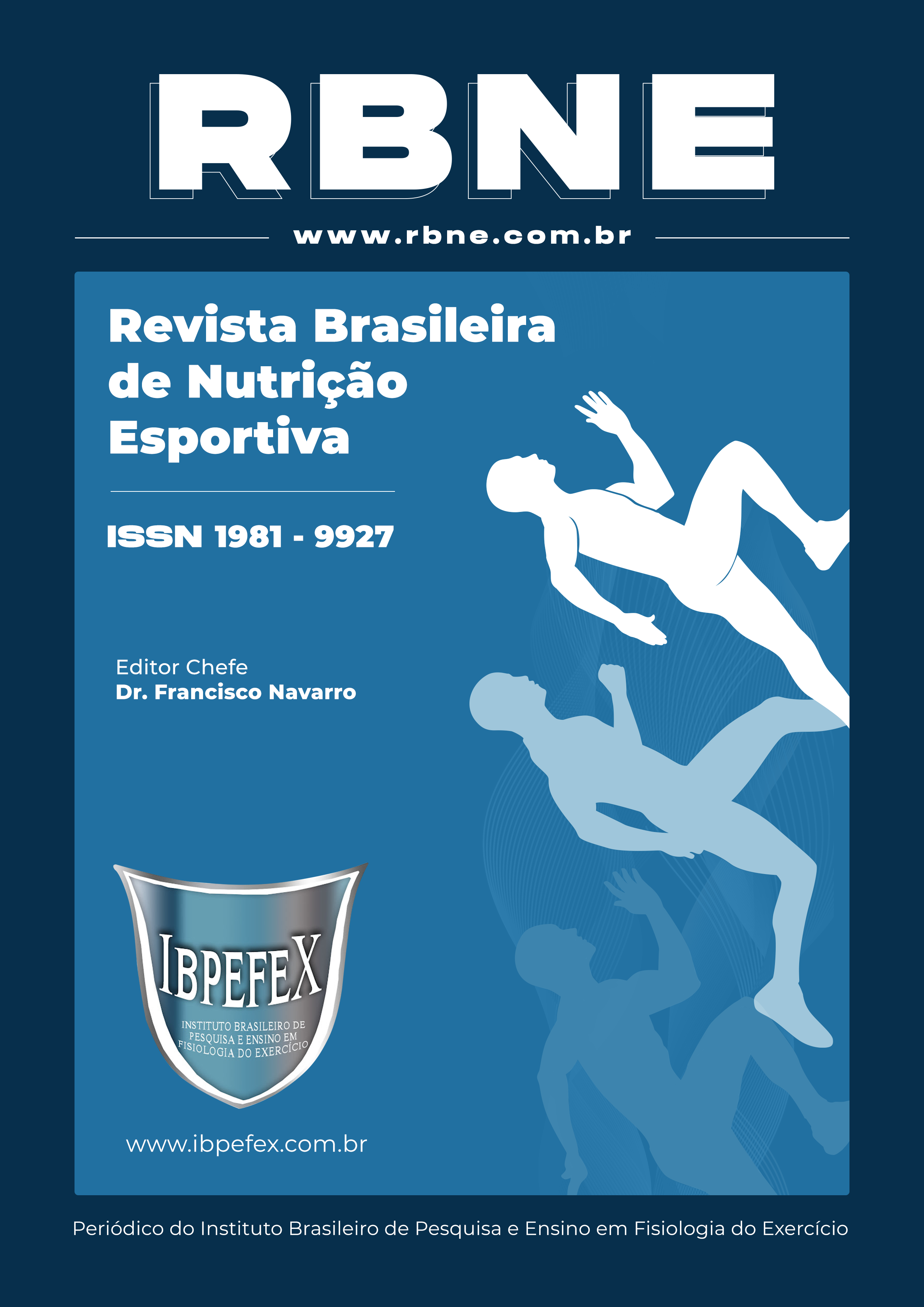Use of food supplements in martial art practicers in a Fortaleza-CE academy
Abstract
In recent years people have been awakening to the need for a higher quality life, which is often sought through balanced diet combined with physical exercise. This aspect has been growing both among those who previously only concerned themselves with aesthetics, and among the groups that had the greatest concern regarding health. Given this, the present study aimed to promote an assessment of the use of dietary supplements by practitioners of martial arts. Therefore, a descriptive and quantitative study with exploratory approach was performed. Having been used as a data collection tool a questionnaire with objective questions containing identification, martial art and use of supplementation. The target audience are practicing students of Jiu Jiutsu and Muay Thai at a gym located in Fortaleza-CE. It was found from this study that less than half of the survey participants use qualified professionals to receive the indication of the use of dietary supplements. And for this reason they may end up following a wrong recommendation, as each body is different, as well as training and diets. Therefore, it is emphasized that only a qualified professional, through evaluation and examinations, can indicate the best supplement and its quantities, as well as warn the user about possible risks, preparing him for conscious use of the product.
References
-Barros, A. J. S.; Pinheiro, M. T. C.; Rodrigues, V. D. Conhecimentos acerca da alimentação saudável e consumo de suplementos alimentares por praticantes de atividade física em academias. Revista Brasileira de Nutrição Esportiva. São Paulo. Vol. 11. Num. 63. 2017. p. 301-311.
-Brasil. Ministério da Saúde. Conselho Nacional da Saúde. Resolução n. 466, de 12 de Dezembro de 2012. Aprova as diretrizes e normas regulamentadoras de pesquisas envolvendo seres humanos. Brasília. Diário Oficial da união. 1212/2012.
-Carvalho, T. Modificações dietéticas, reposição hídrica, suplementos alimentares e drogas: comprovação de ação ergogênica e potenciais riscos para a saúde. Revista Brasileira de Medicina do Esporte. Vol. 15. Núm. 3. 2009.
-Duran, A.C.F.L.; Latorre, M.R.D.O.; Florindo, A.A.; Jaime, P.C. Correlação entre consumo alimentar e nível de atividade física habitual de praticantes de exercícios físicos em academia. Revista Brasileira Ciência e Movimento. Vol. 12. Num. 3. 2004. p. 15-19.
-Gomes, G.S.; Degiovanni, G.C.; Garlipp, M.R.; Chiarello, P.G.; Jordão Junior, A.A. Caracterização do consumo de suplementos nutricionais em praticantes de atividade física em academias. Medicina. Ribeirão Preto. 2008.
-Jesus, E.V.; Silva, M.D. Suplemento alimentar como recurso ergogênico por praticantes de musculação em academias. In: Anais do III Encontro de Educação Física e áreas afins. Departamento de Educação Física. UFPI. 2008.
-Lopes, I. R.; Souza, T. P. M.; Quintão, D, F. Uso de suplementos alimentares e estratégias de perda ponderal em atletas de jiu-jitsu de Ipatinga-MG. Revista Brasileira de Nutrição Esportiva. São Paulo. Vol. 8. Núm. 46. p. 254-263. 2014.
-Panatto, C.; Kühl, A. M.; Vieira, D. G.; Bennemann, G. D. A.; Melhem, R. F.; Queiroga, M. R.; Carvalhaes, M. F. M. Efeitos da prática de atividade física e acompanhamento nutricional para adultos: um estudo caso-controle. Revista Brasileira de Obesidade, Nutrição e Emagrecimento. São Paulo. Vol. 13. Núm. 78. 2019. p.329-336.
-Sá, V. M.; Carvalho, M. A.; Guedes, A. C.; Santos, J. B.; Sá, L. M.; Gratão, L. H. A.; Nascimento, G. N. Estado nutricional e uso de suplementos alimentares por acadêmicos de nutrição da Universidade Federal do Tocantins. Revista Brasileira de Nutrição Esportiva. São Paulo. Vol. 12. Núm. 74. 2018. p.724-732.
-Sá, C. A. G.; Bennemann, G. D.; Silva, C. C.; Ferreira, A. J. C. Consumo alimentar, ingestão hídrica e uso de suplementos protéicos por atletas de jiu-jitsu. Revista Brasileira de Nutrição Esportiva. São Paulo. Vol. 9. Núm. 53. p. 411-418. 2015.
-Silva, T. O currículo como fetiche: a prática e a política do texto curricular. Belo Horizonte. Autêntica. 2003.
-SBME. Sociedade Brasileira de Medicina do Esporte. Modificações dietéticas, reposição hídrica, suplementos alimentares e drogas: comprovação de ação ergogênica e potenciais riscos para a saúde. Diretriz da Sociedade Brasileira de Medicina do Esporte. Revista brasileira de medicina do esporte. Vol. 9. Num. 2. p. 1-13. 2003.
-Souza, A. L. N.; Schneider, A. C. R. Avaliação do conhecimento sobre suplementação alimentar dos praticantes de academia de Novo Cruzeiro-MG. Revista Brasileira de Nutrição Esportiva. São Paulo. Vol. 10. Num. 55. 2016. p. 87-92.
-Tobaja, D. M.; Ferraz, R. N.; Sesso, A. C.; Christofoletti, K. Avaliação dos lutadores de muay thai. Piracicaba. Unimep. 2007.
-Zamin, T. V.; Schimanoski, V. M. Avaliação de hábitos alimentares saudáveis e uso de suplementos alimentares entre frequentadores de academias. Revista Brasileira de Nutrição Esportiva. São Paulo. Vol. 4. Núm. 23. 2010. p. 410-419.
Copyright (c) 2023 Barbara Reboucas Sombra, Iveliny Emmanuelle Mesquita Mello Sobreira, Fernando Cesar Fernando Cesar Rodrigues Brito, Vanessa Duarte de Morais, Andre Ricardo Binda de Borba

This work is licensed under a Creative Commons Attribution-NonCommercial 4.0 International License.
Authors who publish in this journal agree to the following terms:
- Authors retain the copyright and grant the journal the right of first publication, with work simultaneously licensed under the Creative Commons Attribution License BY-NC which allows the sharing of the work with acknowledgment of the authorship of the work and initial publication in this journal.
- Authors are authorized to enter into additional contracts separately for non-exclusive distribution of the version of the work published in this journal (eg, publishing in institutional repository or book chapter), with acknowledgment of authorship and initial publication in this journal.
- Authors are allowed and encouraged to post and distribute their work online (eg, in institutional repositories or on their personal page) at any point before or during the editorial process, as this can bring about productive change as well as increase impact and impact. citation of published work (See The Effect of Free Access).






